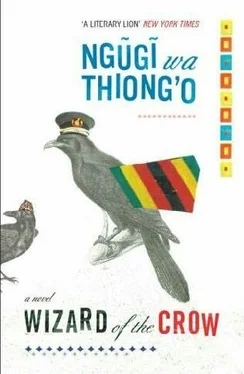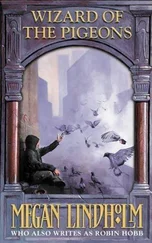The Ruler was in a self-congratulatory mood for successfully turning the day of the so-called National Self-Renewal into a national celebration of his birthday. By declaring the day a public holiday, he had taken the sting out of the call for a general strike. Even one newspaper not known for its excessive enthusiasm for the dictatorship wrote that the Ruler was a consummate politician.
Tajirika, who had already ensured that Burl bills were well stacked in four helicopters marked NORTH, SOUTH, EAST, and WEST, had gone to the grounds early to observe everything in case his views were ever sought, but after greeting the leaders of the various armed forces, conveying his good wishes for their welfare, he retreated and stood way back at the fringes of the crowd. He knew that the stampede set in motion by the Burl manna from Heaven posed danger, and he had even told Vinjinia and his children not to attend.
Sikiokuu had parked the getaway car just outside the assembly. With sunglasses on and a hat to cover his ears, he sat at the driver’s seat, holding a mobile phone, with which he communicated with both the State House and his hired armed thugs now seated in a strategic place near the platform. Their task was one only: to snatch the Wizard of the Crow at the signal and take him to Sikiokuu’s waiting car, from where Sikiokuu would take over. Though he remained inside the car, Sikiokuu kept peering outside at the sky for fear that he might miss the blessed signal of Burl bills from above.
Kaniürü, who had interpreted the Ruler’s call on him to organize an escort for the wizard as a hidden mandate to dispatch the sorcerer to Hell after the confession-for why else would the Ruler be explicit about the journey to the assembly but silent about the return?-had already organized the group that would cover the Wizard of the Crow on either side as he walked to the platform. The official plan was for an unmarked police vehicle to drop the Wizard of the Crow a few yards from where the crowds began and for him to walk the rest of the way through the throng, apparently without coercion, but he would be made aware, of course, that he was surrounded by possible assassins to discourage thoughts of escape. Kaniürü kept to himself his intention to eliminate the Wizard of the Crow at last. His youth knew only that after the confessions they were to escort the Wizard of the Crow and force him into Kaniürü’s Mercedes-Benz, and then Kaniürü would tell them what to do next. He himself crept forward to a spot close enough to the platform to see and hear everything. For his own comfort he kept patting the gun in his pocket as if it were a protective talisman against any sorcerous tricks of his adversary.
Nyawlra and her people were also close to the platform, ready to act on any of their different options, depending on how the scene unfolded.
And then there were the official forces of law and order, the army, which surrounded the entire field, most of them entirely unaware of any of the plots against the Wizard of the Crow. Armed to the teeth, they waited for word from their commanding officers but were careful not to provoke the crowd.
Religious leaders said prayers and called on God to bless the day that all might end well; that the day should mark the beginning of a new life of tolerance and openness in the country and that all may glorify and praise God in various voices without fear. E pluribus unum, one of them kept saying.
The university youth ran the proceedings, and speaker after speaker kept reminding people why the assembly had become necessary. It was a coalition of interests all united by the one desire to recover their voice in running the affairs of the land. As part of this commitment, nobody, even those with contrary views, would be prevented from airing their views. It was a day for national self-renewal and the recovery of their individual and collective voice.
Look in my eyes and see
I don’t fear death
As I demand the voice
You took from me
They had sung the song for weeks, A.G. would later tell his listeners, but on that day they rendered it with special intensity.
“True! Haki ya Mungu,” A.G. would swear to emphasize the truth of his assertions, adding, “Everything was uncertain. The very name of the day was in contention: was it the Day of the Ruler’s Birthday, the Day of National Self-Renewal, or the day the Ruler would give birth? One thing was certain: everybody wanted to hear the Wizard of the Crow on the mystery of male pregnancy.”
The Wizard of the Crow reached the assembly grounds early in the afternoon, led by Big Ben Mambo. To his left and right were armed policemen, followed by others who carried five parcels. All around them were the media folk, jostling for a better view of the sorcerer. People whispered: The Wizard of the Crow. Then the silence of curiosity.
“True! Haki ya Mungu! There was nobody, even among the children, who so much as sniggered or dared to cough” was how A.C. would later describe the moment. “I had gotten there quite early to see if I could catch his attention, even for a fleeting second, and ask him about the thing, the being of all things, for I had reached a point in my life when I came to view words differently. A closer look at language could reveal the secret of life. Many questions intrigued me: What gave the wizard so much power and insight? His magic potions, or something beyond the senses? Was it a knowledge that could be passed on to another? True! Haki ya Mungu! I felt that if I could talk to him my life might acquire meaning. But when he came to the grounds and I saw how he was guarded and pursued by the media, I realized that I would not be able to get near him. But I would still keep my ears open so as to catch every word that fell from his lips. I recalled his words at the bar: No, hapana! No! That is not how it happened. So how did it? I asked myself.
“I saw Big Ben Mambo, the Minister of Information, climb up to the dais, nudging the Wizard of the Crow forward as if guiding him to a seat. Big Ben Mambo cut a funny figure; even now he walked erect as if leading an army parade. This one should have been a member of the armed forces, I found myself musing. The police and the media sat in front of the crowd, all facing the dais. I also crept toward the dais and went as far as those seated in front of me would allow. Beally I did not want to miss a single word or act…”
The students who had taken on the role of masters of ceremony gave the minister time to speak and, to dissenting whistling from some sections, they explained that this was a People’s Assembly and the minister, like every other citizen, had a right to speak and air his views. Big Ben Mambo was unhappy that mere students were giving him permission to speak, but he reckoned that this was not the time or place to start an argument or be defiant. Big Ben Mambo began by saying that he was there as a messenger from above, and so he was speaking in the name of the Buler, Father of the Nation and Commander in Chief of the Armed Forces. He then thanked the Buler for allowing the assembly to take place on the hallowed grounds of Parliament and the courts. He especially thanked him, on behalf of all those now assembled here, for accepting, in advance, the love and adoration that they all had come here to express on His Mighty s birthday…
“You mean his delivery date?” some people shouted, and started chanting: “Who is responsible for the pregnancy?”
“Please allow me to finish my speech,” Big Ben insisted. “Now, about the pregnancy: you will get to hear all about it from the mouth of the Wizard of the Crow. He will also expose all enemies of the State.”
“The enemies of this State are friends of the people,” others shot back.
Читать дальше












